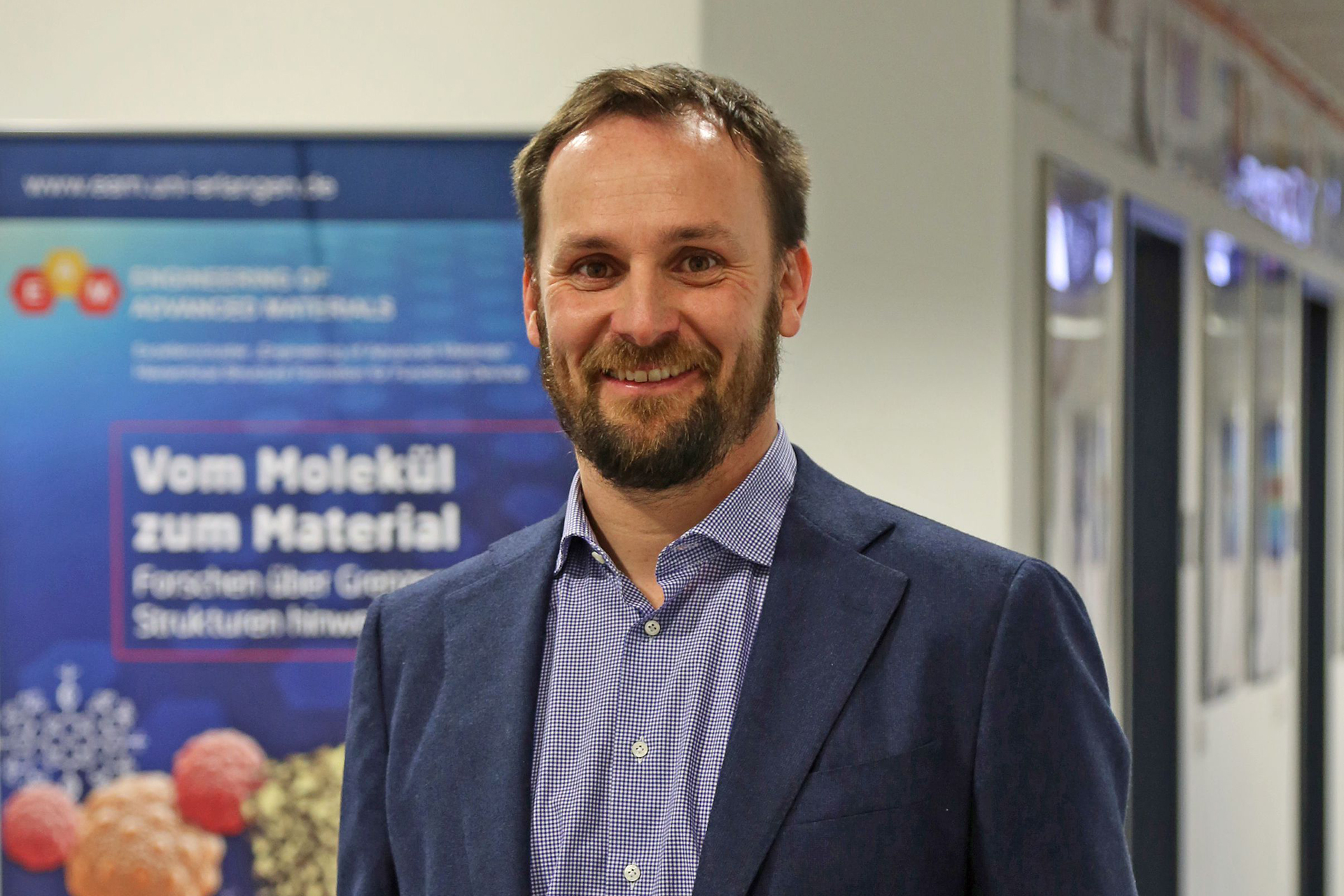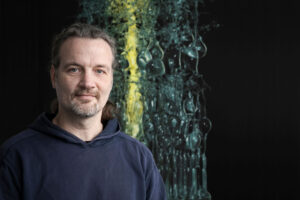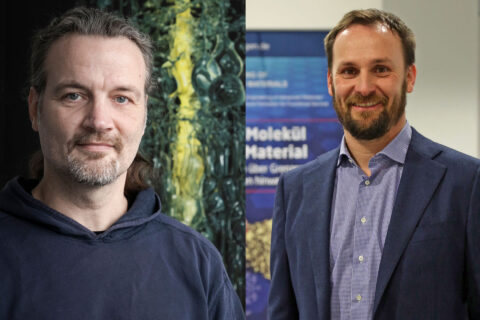Two ERC Synergy Grants for FAU researchers
MAP supervisor Karl Mayrhofer and Kristian Franze receive prestigious European funding
Not one, but two researchers at FAU have been awarded a Synergy Grant, one of the most prestigious grants awarded by the European Research Council. Chemist Prof. Dr. Karl Mayrhofer has received funding for his work on electrocatalysis, and physicist Prof. Dr. Kristian Franze for investigating the mechanic processes behind brain folding.
The ERC Synergy Grant is the only European grant that is awarded exclusively to consortia consisting of several research groups. With these grants, the ERC aims to support outstanding projects that can only be mastered by pooling various perspectives, abilities and resources. Funding covers a period of six years and amounts to a total of ten million euros for each of the consortia.
Science minister Markus Blume emphasized while announcing the funding for Bavarian universities: “With their research and innovative contributions aimed at feeding the world’s population in the future, treating cancer, the scourge of humanity, and untangling unsolved mysteries of the brain, the Bavarian recipients of the ERC Synergy Grants truly are stars of the leading international research scene. In Bavaria, we provide the ideal conditions for these pioneers of our times in particular thanks to our innovation offensive the Hightech Agenda, in which we are investing 5.5 billion euros. With five of the Synergy Grants, some of the most prestigious research awards in Europe, being awarded to researchers in Bavaria in one year, this confirms how effective our policies are and stress once again that Bavaria is a world-class location for research. Congratulations to the outstanding researchers and their excellent universities.”
The material librarian: Prof. Dr. Karl Mayrhofer
Hydrogen is a highly promising energy source. However, the production of hydrogen depends on the catalysis of reactions, some of which require extreme conditions. The electrocatalysts available to date do not usually last long under these conditions. New materials are required that are powerful, long lasting and ideally do not contain any rare or expensive elements.
In the project, “Directed Evolution of Metastable Electrocatalyst Interfaces for Energy Conversion”, DEMI for short, researchers from Germany, Denmark and Switzerland are systematically looking for suitable materials: “The most promising materials for electrocatalysts are those that consist of five elements or more,” explains Prof. Dr. Karl Mayrhofer, Executive Director and Head of Research Department Electrocatalysis at Helmholtz Institute Erlangen-Nürnberg (HI ERN). “We are basically looking for the proverbial needle in the haystack, as there is a virtually infinite number of possible compounds.”
The project team is following an evolutionary strategy. They calculate and simulate promising material combinations, make small adjustments to them and check whether these have a positive or negative effect. Working systematically like this, the researchers hope to track down new, improved materials. A “material library” should allow researchers to create thousands of compounds at the same time, expose them to extreme electrochemical conditions and thereby identify the “survivors” very quickly .
At HI ERN, a world leader when it comes to equipment and expertise for high-throughput screening of materials, the promising candidates are tested in terms of their potential electrochemical performance. The work focuses on simultaneously recording the materials’ activity and stability in a matter of seconds in various operating conditions. Karl Mayrhofer: “Our data-driven, connected approach will make catalysts more stable and able to perform more effectively. Our aim is to increase the efficiency of water electrolysis and the operation of fuel cells.”
Profile

Karl Mayerhofer studied technical chemistry at the Vienna University of Technology and completed his doctoral degree there in 2006 after completing a two-year research stay at Lawrence Berkeley National Laboratory, USA. After spending time as a postdoctoral researcher at TU Munich, he was appointed group leader in the Department of Interface Chemistry and Surface Engineering at the Max-Planck-Institut für Eisenforschung in Düsseldorf in 2010. Since 2015, he has been a professor of electrolysis at FAU and together with Prof. Dr. Peter Wasserscheid and Prof. Dr. Christoph Brabec, he is a director of the Helmholtz Institute Erlangen-Nürnberg for Renewable Energy (HI ERN). His department focuses on the electrochemical transformation of energy in low-temperature fuel cells and electrolyzers.
The brain mechanic: Prof. Dr. Kristian Franze
Kristian Franze, who has been a Humboldt professor and the director of the Institute of Medical Physics and Microtissue Engineering at FAU as well as Max Planck Center for Physics and Medicine, conducts research into the growth of nerve cells. He does not focus primarily on the biochemical processes but rather on the mechanical forces that influence their growth. In earlier studies, Franze discovered that the rigidity of the surrounding brain tissue plays a considerable role in guiding growing nerve cells in the right direction.
The UNFOLD project, which the physicist and veterinarian Franze is involved in together with Spanish, Belgian and French researchers, aims to intensify this work and has been awarded an ERC Synergy Grant for its research. The consortium focuses predominantly on cortical folding. It is known that mammals with higher cognitive functions have a highly folded cortex, and that anomalies are associated with various disabilities.
In spite of their relevance for clinical diagnosis, however, the causes and consequences of cortical folding are still largely unknown. For a long time, it was assumed that the folding was due to limited volume within the skull,” explains Franze. “Today we know that that is not the case. We presume that it develops due to a dynamic interaction between mechanical and molecular processes and that it has far-reaching consequences for the architecture and function of the brain.”
The UNFOLD team will test this hypothesis using a combination of genomics, cell biology, the mechanics of brain development and computer models. They will investigate, for example, how cellular processes affect tissue mechanics. The aim is to identify key mechanisms that lead to the folding of the cortex and to determine how the structure of the brain affects the functioning of neural networks and the behavior of animals. According to Franze, “gaining a better understanding of the mechanisms behind neural growth will allow us to make an improved contribution towards treating neurological diseases for which there is currently no cure.”
Vita

Prof. Dr. Kristian Franze, has been the Director of the Institute of Medical Physics and Microtissue Engineering at FAU and the Max Planck Center for Physics and Medicine (MPZPM) since August 2020. The MPZPM is a joint institution of the Max Planck Institute for the Physics of Light (MPL), FAU and Universitätsklinikum Erlangen. Franze’s research into the interaction between mechanics and the nervous system is considered to be pioneering. He has received several awards for his work, including an ERC Consolidator Grant and an Alexander von Humboldt Professorship, Germany’s most prestigious research prize. Before transferring to FAU, Franze was a professor of neural mechanics at the University of Cambridge, UK. Franze studied veterinary medicine at Leipzig University and completed a doctoral degree in physics there.
Further information
FAU Press Office
Phone: + 49 9131/85-70229
presse@fau.de

